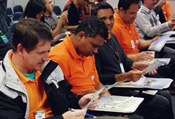Anti-corruption
An ethics program was rolled out to enhance employee understanding of Group expectations for personal and corporate ethical accountability, including anti-corruption. This includes an ethics helpline operated by a third party, where employees can confidentially report suspected misconduct.
Latin America was the first to launch the program by training 8,100 blue- and white-collar staff members. An extensive educational campaign included workshops for management as well as factory workers, e-learning and information materials. The helpline for Latin America also opened in June 2011.
A total of 38 suspected incidents of ethical misconduct were reported to the ethics helpline in 2011. The bulk of cases arose from interpersonal issues.
In 2012, the ethics program will be rolled out in Europe. (See more at Management approach: Society and the above case study).
Employees who violate a Group Policy may be subject to disciplinary action, up to and including dismissal, depending on the facts and circumstances.
Public policy
Electrolux has adopted formal policy positions at Group-level on core strategic issues such as supporting market incentives that trigger change in consumer purchasing. Public policy initiatives are primarily conducted through industry organizations such as the European Appliance Industry Association (CECED) and the American Home Appliance Manufacturers Association (AHAM).
Public policy issues relevant to Electrolux include climate change, energy efficiency, resource efficiency, producer responsibility for recycling and collection of waste, product labeling, and chemicals use. Performance standards and legislation vary between regions of the world; a challenge for companies active in many markets. Electrolux therefore supports global harmonization of standards and legislation.
The Group’s lobbying and other public positions as well as the policies of Electrolux, are all in line with the Group’s sustainability goals.
Policy work in Europe
Electrolux has an office in Brussels and continuously engages with legislators, parliamentarians and EU offices in regards to these issues. The Group logs its European activities through the EU’s voluntary transparency register, managed by the EU Commission. It states that Electrolux has a staff of four work and annually invests SEK 3.6m (€400,000) in such activities.
Legislation of key relevance includes:
- The WEEE Directive
- The RoHS Directive
- Energy labels for household appliances
- REACH regulation
- F-gas regulation
- Resource-efficiency discussions
Employees active at the European Affairs department are members of the Society of European Affairs Practitioners, and have signed its Code of Conduct.
Political activities
Electrolux does not make political contributions, including donations to politicians or political parties. Employees who engage in dialog with governments and other public bodies to inform or influence public policy must do so responsibly and transparently, making it clear at all times that they represent Electrolux.
Compliance
Potential non-compliance, disputes or items that pose a material financial risk are reported to Group level in accordance with Group policy. No significant fines were reported in 2011.
Please see Annual Report, Contingent liabilities.

